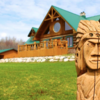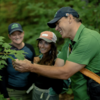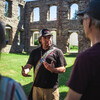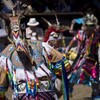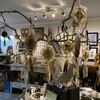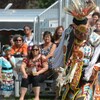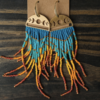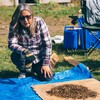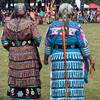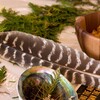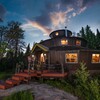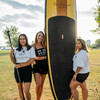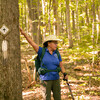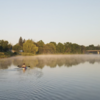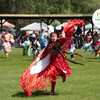
Sister Bear Designs

Beading and working with leather has always been a part of family life for the Anishinaabe team behind Sister Bear Designs, which includes sisters Kathleen Sawdo, Valerie, Malinda, and their mother Roberta.
Being members of the Lac Des Mille Lacs First Nation, and with family ties to Fort William First Nation, the Sawdo sisters picked up the skills from their grandparents, aunties, and uncles, and didn’t turn it into a business until 2013, when the eldest sisters, Valerie and Kathleen, thought it would be fun to start creating as a family.
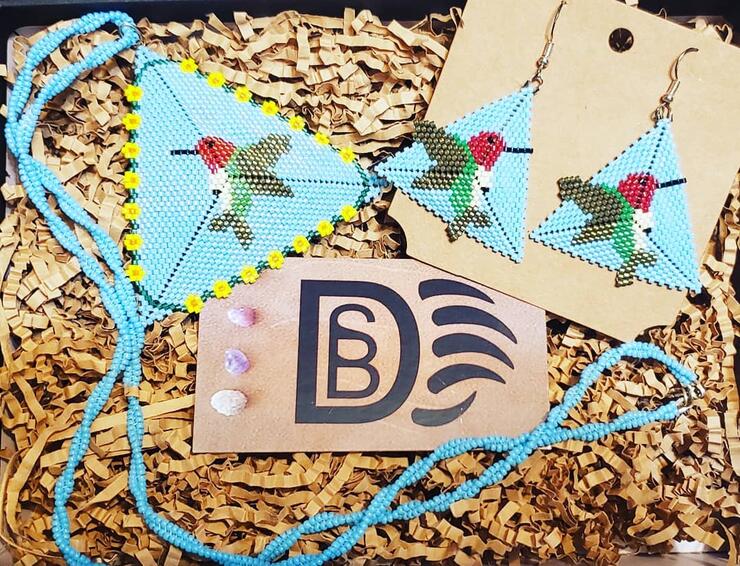
The origins of their Thunder Bay-based business began in Alberta at an Elder’s gathering, where they sold an older-style beadwork that was recognized amongst the Elders, and the positive feedback gave them the confidence to launch Sister Bear Designs.
“Out west they didn't see a lot of Thunderbirds [in the beadwork]...people were doing a lot of more contemporary styles, and at that time we were making moccasins and we would bead right on the leather so that was appreciated because not many people do that,” says Kathleen Sawdo.
When Sawdo moved back to Ontario in 2018, the business moved from being a side gig to a full-time business to help support the family, and in 2019, they opened up a booth at the Thunder Bay Country Market. The space was decorated to look like their grandfather’s trapper cabin, with chipboard walls and old family photos.
New Storefront, New Collections
“We had pictures of our family going back generations and really broke barriers with people,” she says. “There's a picture of our old yellow Ski-Doo, and whether you're Indigenous or not, if you live in the north, someone in your family had one of those. People loved looking at the old pictures of being out in the bush, hunting, and seeing the whole family involved at some point.”
That same vibe will be landing at Sister Bear Design’s space at the Goods & Co. Market, the new shopping hub and business incubator set up in the old Eaton Centre building near Thunder Bay’s waterfront. While they’ve left behind the Thunder Bay Country Market, they’ve brought along some of the chipboard and all of the family photos to their new space, which will serve more as a storefront than a booth. They will still participate in the Craft Revival, and other local markets and will be at Indigenous Fashion Week Toronto.
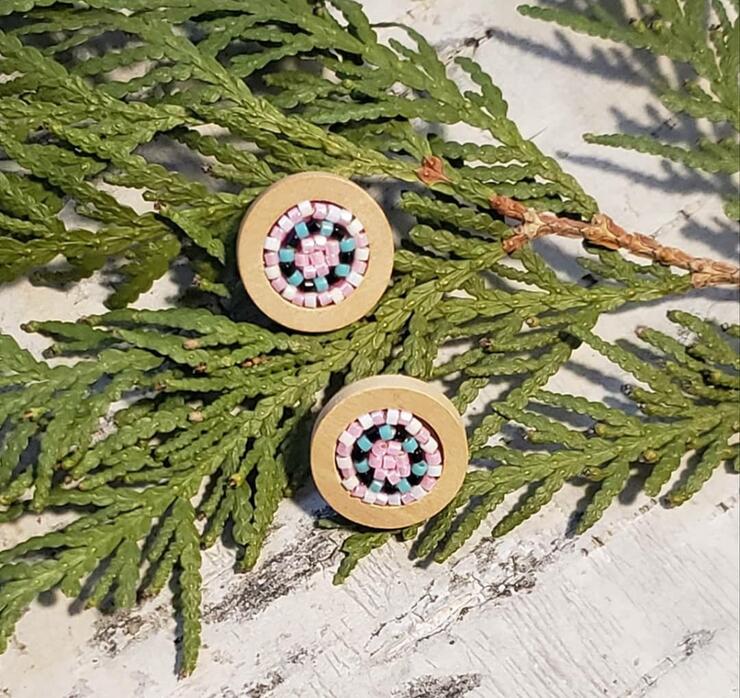
Mixed material studs by Sister Bear Designs // Photo credit Sister Bear Designs facebook page
Some of the things they’ll be selling include new collections, like the Land Back collection—each piece is inspired by her own lands where Sawdo is in the process of building a house.
“We take the whole family out, and the kids will grab different medicines and ask about them, so I take the time to show them wild ginger, strawberry, raspberries, and fiddleheads, so the kids would pull a leaf off, and I saved it and I pressed it in an actual phonebook,” says Sawdo, and some of those wildflowers and leaves have been incorporated into earrings and necklaces.
Sister Bear Designs is truly a family business, with both of Sawdo’s boys beading peyote-stitched lanyards, the eldest sister doing beaded embroidery, and the youngest sister also making peyote-stitched lanyards as well as ribbon skirts, and a niece doing jingle cone earrings. Sawdo makes a bit of everything, from brick stitch and some of the longer earrings, to quill work, leather work, and ribbon skirts.
Seasonal Fashion, Local Hides
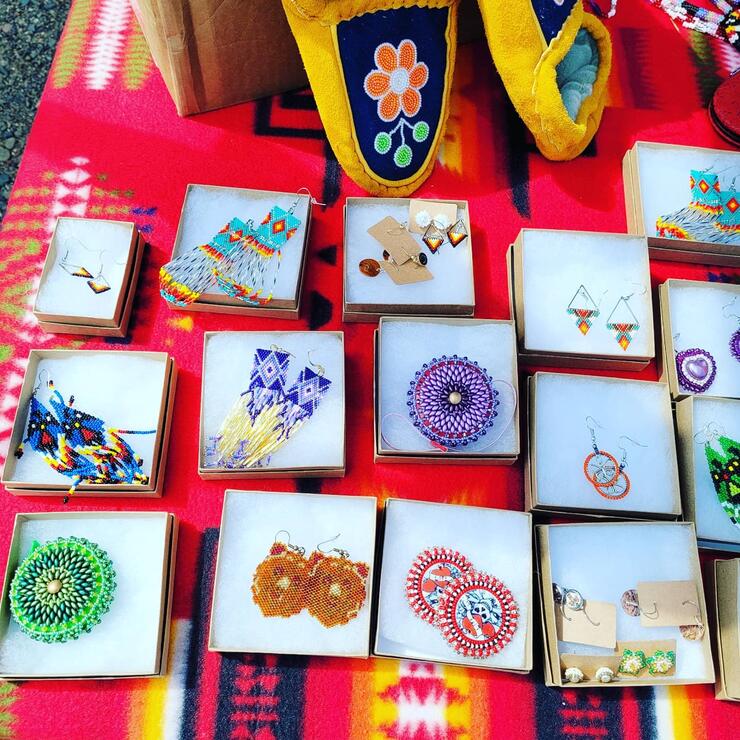
The sister's designs can be found at local craft shows and events as well as their new store in Goods & Co., downtown Thunder Bay. // Photo credit Sister Bear Designs facebook page
A lot of the jewelry the family makes is inspired by the seasons. “We bead what we see, so in the fall time there’s a lot more oranges, whereas in the summertime we may bead strawberry leaves, so the time of year really guides what we make and how we make it.”
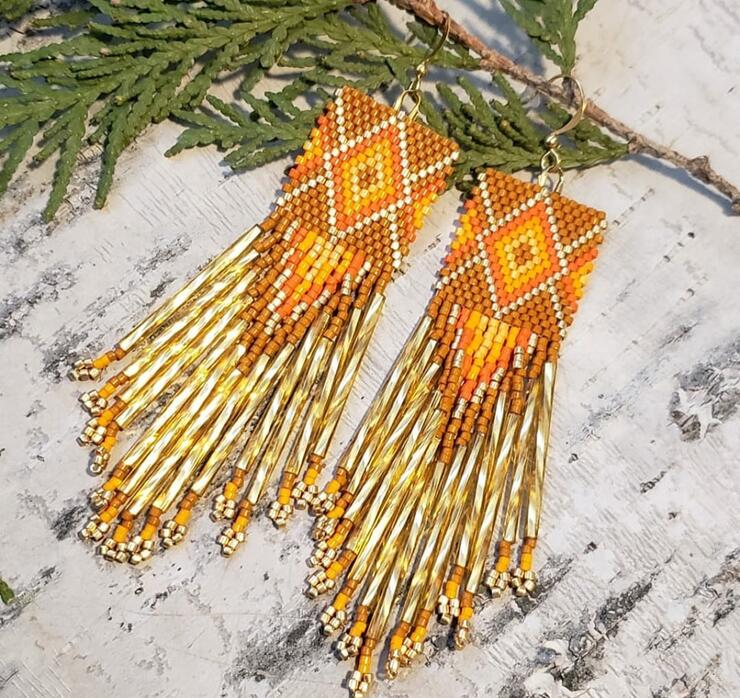
Autumnal earrings from Sister Bear Designs // Photo credit Sister Bear Designs facebook page
“We grew up in Thunder Bay, where it wasn't a place to be proud of being Indian,” she says. “I kind of grew up [with the mentality of] ‘Hide it if you can’ and we didn't want that for our children, so this is our way of reclaiming and being proud of it.”
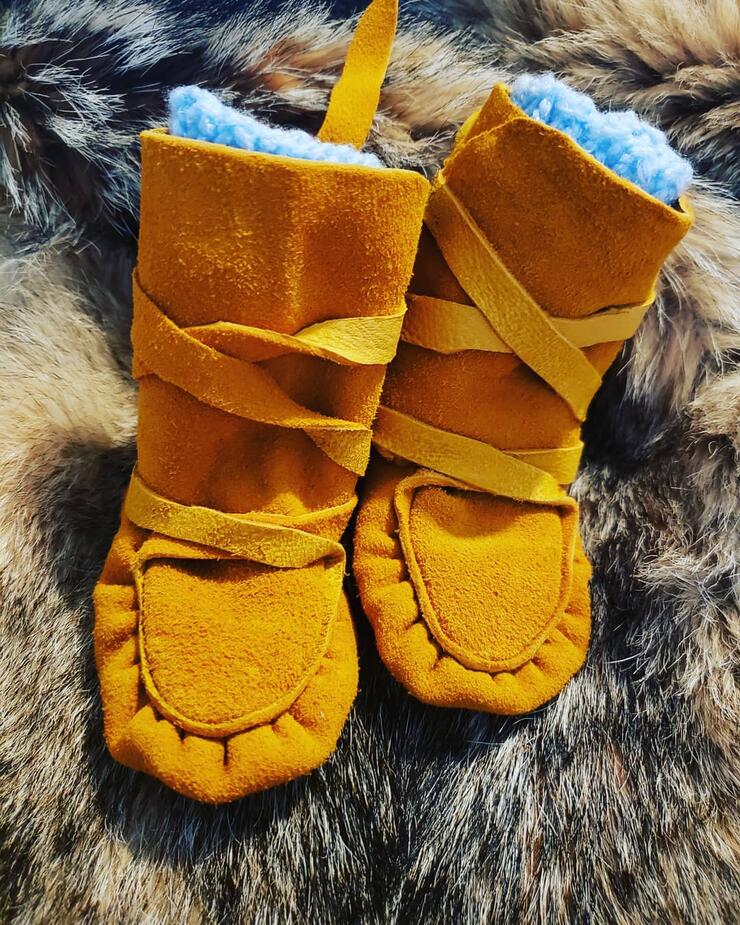
So proud of it, in fact, that Sawdo tans the hides that are part of the leatherwork in her backyard. A lot of family members hunt and trap, and they’ve offered Sawdo hides – she usually gets a couple of moose and about four or five deer hides a year – and applies the lessons of leather tanning that she learned from her trapper grandfather.
Supporting Food Sovereignty
The family business also includes teaching the younger generation some of the skills the sisters have – how to bead and tan the hide – as well as a new focus on more traditional and healthy foods.
Sawdo is learning how to collect wild rice, process it, and cook with it, and aims to sell popped wild rice and dried berries as a healthy snack, and if they can’t cook it themselves, supports other Indigenous businesses by selling dried bison pemmican that comes from Alberta, and birch water from a community up north.
“We really would like to support Indigenous food sovereignty and we have a lot of communities here who are establishing their own reclaiming their food systems,” she says. “We'd like to be able to offer space for Indigenous communities to sell their foods.”
A Positive Impact on the Community
In addition to a physical space, Sister Bear Designs has an online shop to foster sales across Canada. Their website will be updated with more videos showing how they created the item you’re purchasing, and include family members modelling the pieces. Sawdo is looking forward to the site being more interactive, because each piece has a story.
The family business has made a huge impact on not just their lives, but in the community as well. Every purchase made through Sister Bear Designs supports four different households and has put family members through school. Sawdo believes that by having space in Thunder Bay as Anishinaabe people, they are affecting change by having conversations with people, even the hard ones.
“We get a lot of people asking us questions that they're normally scared to ask, especially since the 215 and the recovery of our children across the country,” she says. “How does that make you feel? How does that make you feel about the church? And it's very hard to answer sometimes, but we do because I know non-Indigenous people need a safe space to ask questions. But if we don't participate and have patience and kindness, then things will never change.”

Recommended Articles

Ontario Pow Wow Calendar: 2025 Edition
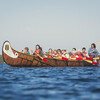
8 Indigenous Tourism Experiences To Book in 2025

Indigenous Restaurants in Ontario

8 Indigenous Experiences to Discover in North Bay
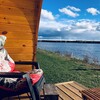
6 Indigenous-owned Accommodations in Ontario

7 Indigenous-Owned Fishing Experiences in Ontario
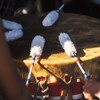
Pow Wow Road Trip
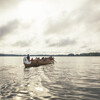
11 Indigenous-Owned Outdoor Adventure Companies in Ontario
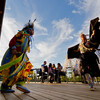
13 Indigenous-Owned Businesses to Visit on National Indigenous People's Day—and Every Day

